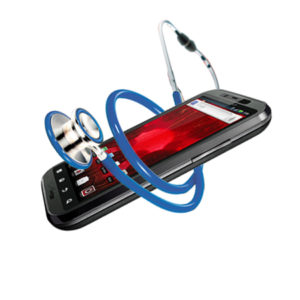 Smartphones in Healthcare
Smartphones in Healthcare
By Michelle Rebecca
These days, it’s rare to find someone who doesn’t own a smartphone. With their portability, quick Internet access and ever-increasing technical capabilities, most users agree the benefits of smartphones far outweigh the extra cost per month. Smartphones aren’t just great for entertainment, either. A growing number of professionals are using their smartphones as part of their jobs. Medical professionals are one such group. According to Epocrates, a mobile healthcare application, 86% of clinical workers use smartphones as part of their job. Here are some of the ways doctors are using their devices to improve patient care.
Journal Research
Most, if not all, scientific and medical journals are available online as well as in print. With the advent of smartphones and tablets, doctors can access the most cutting edge research on drugs, treatments and diseases. Sometimes publishers have apps available for journal reading; if not, you can download the PDF to iBooks or a similar program. Not only are smartphones great for reading articles — they’re also great for storing them, which makes your smartphone a handy digital research tool. You can save any article you buy to your device or cloud and access it in seconds when you want to reference the information later.
Communication With Colleagues
Being able to quickly contact others is important in all professions, whether you’re a salesman or a television production assistant. It’s especially important for doctors to share information with each other; what they learn from their peers’ experiences enables them to better assist patients. Fortunately, communication is easier than ever with smartphones. With the touch of a few buttons, doctors can call, text or e-mail one of their peers. They can also connect with other doctors on Facebook or another social media platform. The more knowledge that flows between doctors and practices, the better medical professionals will be able to diagnose and treat illnesses.
Quick Access to Patient Data
If you’ve been to the doctor recently, you probably noticed someone in the clinic taking notes about your condition and treatment. These notes are saved as part of your medical history, which can be accessed by healthcare professionals the next time you get sick. With smartphones and similar devices, doctors can quickly and easily pull up patient data — there’s no need to carry around a clunky computer. The note-taking process can also delay treatment, which is why some professionals are recording patient conversations on their phone and transcribing them at a later time.
Right now, there are some limits on how much information doctors can access and exchange via a mobile device. A number of hospitals grant mobile network access to a small number of the clinicians they employ. However, this may change as more data systems get with the times.
Mobile Health Systems
A number of medical practices have already optimized their systems for mobile use. Epocrates and Medscape are two examples of mobile reference applications that doctors can use when treating patients. By simply opening an app, doctors can access a wealth of information on diagnostic tools, treatment options, prescriptions and alternative medicine. All information is peer-reviewed by trusted doctors, so you know the data is as accurate as possible. By using apps like these, doctors hold a medical encyclopedia in the palms of their hands.
The use of smartphones in the medical industry is continuously growing. If they’re not already, doctors should absolutely begin incorporating their smartphones into their day-to-day job duties. Not only will it make their jobs easier, it will also improve their efficiency.
Michelle is a freelancer and journalist. She frequently reports on the Health IT, with an emphasis on social media’s role within the industry. She’s had a variety of different jobs throughout the years, including working for 12 Keys Best Rehab, which allowed her to gain the knowledge needed to write about various different topics in the health field and beyond. Follow her on Twitter and Google+.
